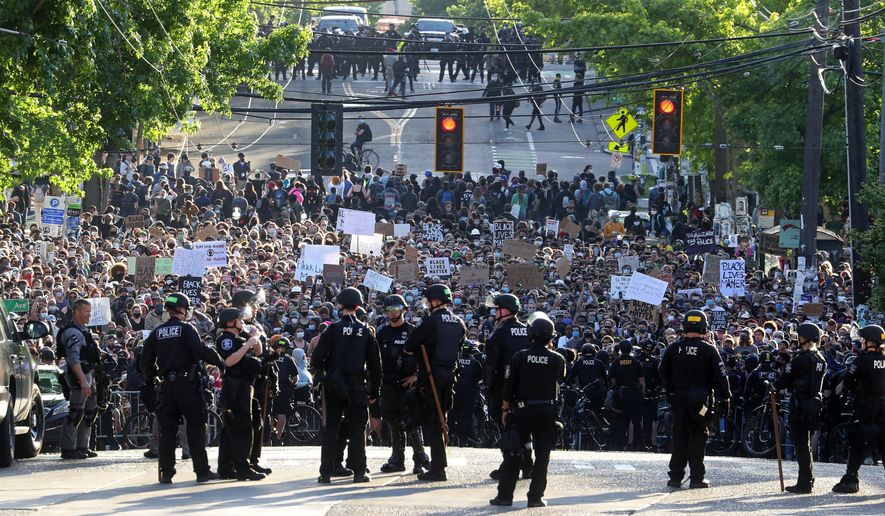SEATTLE (AP) - Seattle Police Chief Carmen Best on Wednesday vowed to make sure her officers’ badges are visible when they cover protests and agreed to look into crowd-control tactics, but she defended their need to wear protective equipment.
“What we’re seeing out here, it is unprecedented in terms of the level of anger, rage, disappointment, hurt, infuriated people coming together to really express their First Amendment rights of free speech and really talk about what’s been highlighted for us through the death of George Floyd,” she told members of the Community Police Commission during an online meeting.
And while she’s sickened by the horror of Floyd’s death, she said she has a responsibility to protect lives, property and the officers.
More than 12,000 complaints have been filed against the police since the protests began last week A Minneapolis officer held Floyd face down on the street with his knee on his neck for almost nine minutes even after he stopped moving and pleading for air. The officer and three others face criminal charges.
The pepper spray, tear gas and rubber bullets the Seattle police used against protesters has served to re-traumatize those who came out express their outrage over police brutality across the country, commission members said.
The Commission was formed under a settlement agreement and consent decree in 2012 that followed a federal investigation into excessive force used by Seattle police. Its mission is to provide community-based oversight of the police department and ensure accountability.
“The pain felt today is sadly, not new,” said commission co-chair Rev. Aaron Williams. “Since the 2012 consent decree, 29 people have died as a result of police violence. Their families, friends and communities continue to feel the grief from their deaths.”
Co-chair Rev. Harriett Walden said there’s never been a time in American history when the black community has not stood up for justice.
“It’s not fixed. It’s not going to be fixed until there’s a conversion of the heart, to see us as human. We’ve been fighting to be human ever since we were brought here,” she said.
Commission Executive Director Bessie Marie Scott said the process has left her exhausted.
“I have a black son and I dream sometimes about what will I do when I get a call, what will his funeral look like,” she said. “Every day is a day that I have him a day longer and I don’t know what the unknown is going to be.
“It’s crushing. It’s debilitating the extra layer of processing that I have from what he wears to where he goes to school, how he can be out, who can watch him,” she said. “I don’t think it’s anything that any parent should have to go through.”
Commissioner Colleen Echohawk said she’s deeply disappointed with the police response to the protests.
“I’m heartbroken that we’ve spent so much time on police reform and it seems like none of that work has mattered,” she said. “It’s not a few bad apples. The barrel is poison.”
Seattle Mayor Jenny Durkan told the group “the murder of Mr. Floyd was the precipitating events for what we’re seeing in this nation but it was not the cause.
“The cause is rooted in the systemic racism of our nation,” she said.
Until there’s true systemic change not just in policing but in every system in the country, “we will not be the country that we hold ourselves to be,” she said.
Durkan said she knows many on the commission distrust her personally and distrust the police, but she said she will always listen. Soon after Durkan began speaking, a commissioner cut her off and brought the discussion back to what happened on the streets of Seattle.
“Pepper spray. Flash balls,” said Walden. “At the drop of a hat we can go back to actually some place in time. My son got shot by a rubber bullet last night. He’s a journalist. He was out there filming what was really happening.”
The officers escalated the tension, she said, and failed to make arrests on Friday night when looting was happening.
Durkan said thousands of people were marching in Westlake Mall without incident, but a few blocks away, the mood was completely different. Cars were burned, people were hit with rocks and bottles. That’s what sparked the police response, she said.
Best said she could not speak to some of the claims that have been made against officers, but she trusted the investigations being done by the Office of Police Accountability.
“Not everything was perfect,” she said. “There will be things that probably should and will be done better. But this is our opportunity to do it.”
While it was heart wrenching to see people who came out to express their pain, Best said she also saw people doing terrible things.
“They’re throwing rocks, they’re throwing bottles, they’re throwing water bottles that are frozen, they’re throwing urine, they’re throwing feces,” she said
Williams asked why the officers need to be covered in military gear.
“It’s almost like it’s an us-against-them mentality,” he said. There had been an effort to move police from being warriors to being guardians, “but what are they guarding?” he asked. “It seems like their guarding things rather than people.”
Best said she understands that perspective, “but it’s a fine line.”
“We’re trying to move away from that bit if there’s rocks and bottles, it’s hard to say ‘don’t put on a helmet.’ I don’t want anybody hurt.”




Please read our comment policy before commenting.